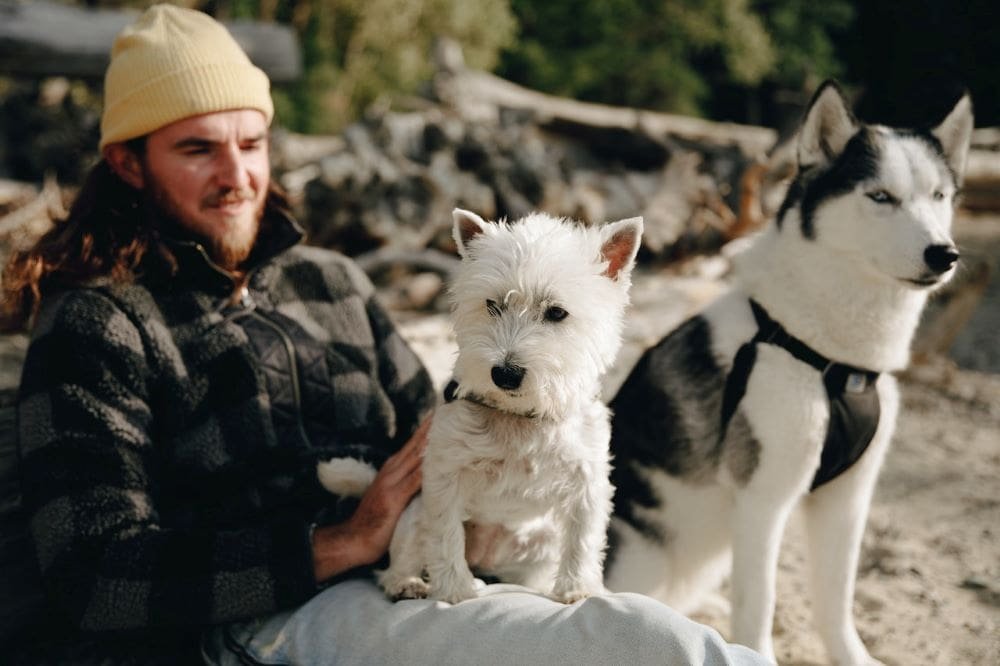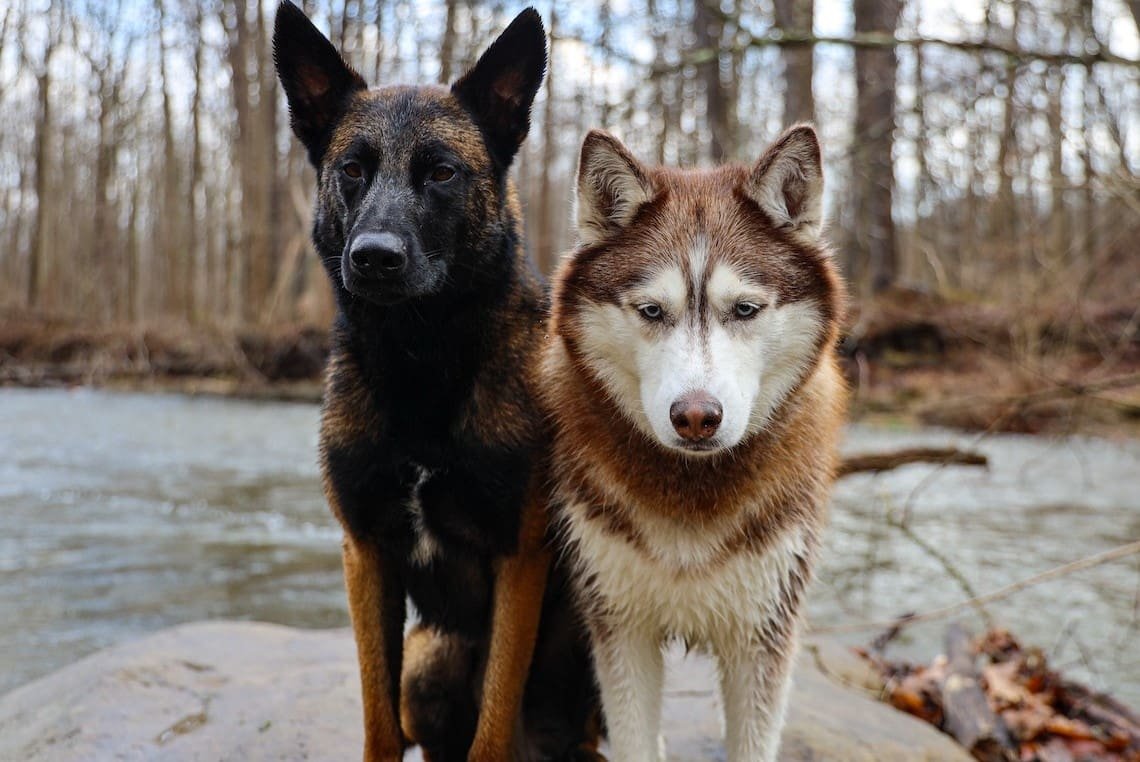Table of Contents
Did you know that Huskies are known for their stunning blue or multi-colored eyes? It’s one of the many captivating features of this beautiful breed. However, beyond their striking appearance, it is also essential to understand the compatibility of Huskies with other dogs. The Question: Are Huskies Good with Other Dogs? Huskies have a unique temperament and specific social dynamics that significantly impact their interactions with other canines.
By understanding their compatibility with different breeds and personalities, we can ensure a safe and harmonious environment for all dogs involved. This article will explore the importance of understanding Huskies’ compatibility with other dogs and provide valuable insights and tips for successful socialization.
Huskies Unleashed
Siberian Huskies are working dogs initially bred in northeastern Russia for use as sled dogs. They are known for their striking wolf-like appearance, with thick fur coats ranging from black to white and beautiful blue or brown eyes. Huskies are highly athletic and energetic, naturally wanting to run and play.
They are also known for their friendly and outgoing personalities, making them great family pets. However, due to their strong-willed nature and need for exercise and stimulation, Huskies require a specific type of owner who can meet their unique needs.
The Complexity of Canine Compatibility
Canine compatibility, especially regarding Huskies, is a complex and multifaceted issue. Various factors can influence how Huskies interact with other dogs, and understanding these factors is critical to ensuring prosperous and harmonious interactions.
- Breed Traits: Each breed has unique characteristics and tendencies that can impact its compatibility with other dogs. Huskies, for example, have a strong prey drive and a pack mentality, which can affect their interactions with other breeds, notably smaller animals.
- Socialization: Early and ongoing socialization is vital to a Husky’s ability to interact with other dogs. Introducing them to different breeds, environments, and individuals from an early age can help shape their behavior and responses.
- Individual Temperament: Just like humans, dogs have their personalities. Some Huskies are naturally more sociable and friendly towards other dogs, while others may be more reserved or dominant. Understanding your Husky’s temperament can help predict their compatibility with other dogs.
- Energy Levels: Huskies are known for their high energy levels and need for regular exercise. Pairing them with a similarly active and energetic dog can help prevent frustration and potential conflict arising from mismatched energy levels.
- Gender and Neutering: The gender of dogs can also play a role in their compatibility. Some Huskies may prefer interacting with dogs of the same gender, while others may get along better with the opposite gender. Additionally, neutering can impact a dog’s behavior and social dynamics.
- Introductions and Supervision: Proper introductions and supervision are crucial when introducing a Husky to any new dog. Slow and controlled introductions, using positive reinforcement techniques, can help establish trust and positive associations between the dogs.
- Training and Obedience: A well-trained Husky is likelier to interact positively with other dogs. Teaching basic obedience commands can help control their impulses and ensure they can follow instructions during social interactions.
Understanding these factors can help dog owners make informed decisions when introducing their Huskies to other dogs, ensuring a harmonious and enjoyable experience for all involved.
Friend or Foe: Are Huskies Good with Other Dogs
Huskies can have varying levels of compatibility with other dogs, depending on their personalities and experiences. Generally, huskies have a strong pack mentality and can be social with other dogs when properly socialized from a young age. However, some huskies may exhibit dominance or territorial behavior, especially around dogs of the same sex.
Monitoring interactions and introducing them to other dogs slowly and carefully is essential. Early socialization, obedience training, and proper supervision can help ensure positive interactions with other dogs. Ultimately, each husky’s temperament and behavior are unique, so it is essential to assess their compatibility individually.
Size Matters: Huskies and Small Dogs
One common concern with Huskies is their interaction with small dog breeds. Due to their high prey drive and larger size, Huskies may pose a potential risk to small dogs. To safely manage these interactions:
- Supervision: Always closely supervise interactions between a Husky and a small dog. This allows you to intervene if necessary and prevent any potential harm.
- Proper Introduction: Introduce the Husky and the small dog in a controlled environment, such as on neutral territory or during a structured walk. This can help them establish positive associations and reduce any potential aggression.
- Socialization and Training: Ensure the Husky and the small dog are well-socialized and trained. Teach them basic obedience commands like “sit” and “stay” to have better control in potentially intense situations.
- Separate Time and Space: Provide separate spaces or crates for each dog to have their own “me time” and ensure they each have a safe place to retreat to when needed.
- Size Appropriate Play: Monitor play sessions and ensure that any play between the Husky and the small dog is size-appropriate. Discourage rough play that could potentially harm the smaller dog.
- Positive Reinforcement: Use positive reinforcement techniques to reward calm behavior and appropriate interactions between the dogs. This helps to reinforce good behavior and discourage any aggressive tendencies.
- Professional Guidance: If you have concerns or need additional support, consider consulting a professional dog trainer or behaviorist who can provide specific guidance and help ensure both dogs’ safety.
Remember, even with precautions, it is essential to be vigilant and prioritize the safety of all dogs involved. Each dog is unique, and individual temperament and socialization experiences can significantly influence their interactions.

The Husky Pack: How Huskies Interact with Their Kind
Huskies are pack animals and typically enjoy interacting and socializing with other Huskies. However, as with any group dynamic, there can be challenges. Tips for Husky owners with multiple dogs of the same breed include:
- Supervision: Closely supervise interactions, especially when introducing new dogs to the pack.
- Slow Introduction: Introduce new dogs in a controlled environment, such as on a walk or in a neutral space, to avoid territorial behavior.
- Provide Alone Time: Allow individual dogs personal space to avoid conflicts.
- Training and Socialization: Ensure all dogs are well-trained and well-socialized to navigate group dynamics safely.
- Equal Treatment: Ensure all dogs receive equal attention from their owners, including exercise, training, and playtime.
- Health Checks: Regularly check the health of each dog to avoid any infectious disease within the pack.
- Consult A Vet: Contact a veterinarian in case of trouble in the pack, such as any aggressive behavior or bullying.
Caring for multiple dogs of the same breed can be challenging. Still, proper management and a thorough understanding of pack dynamics can create a happy and harmonious environment for all involved.
The Wild Instinct: Prey Drive in Huskies
Prey drive in Huskies refers to their instinctual desire to chase and potentially harm smaller animals. This can impact interactions, posing a risk to smaller animals. Strategies to manage Husky behavior include leash control, obedience training, positive reinforcement for calm behavior, distraction techniques, early socialization, avoiding areas with small animals, and seeking professional help.
Consistent training, responsible ownership, and mindful management are crucial to ensure the safety of smaller animals and maintain control when faced with prey drive instincts.
Training For Togetherness
Training and socialization are crucial in improving compatibility between Huskies and other dogs. Practical training tips for Husky owners include:
- Start Early: Begin training and socialization as early as possible to establish good behavior patterns and positive associations.
- Positive Reinforcement: Use rewards, such as treats and praise, to reinforce desired behaviors and create a positive learning experience.
- Basic Commands: Teach essential commands like sit, stay, and come to ensure better control and obedience.
- Leash Training: Train your Husky to walk calmly on a leash, promoting safer and more enjoyable walks with other dogs.
- Gradual Introductions: Introduce your Husky to different dog breeds and sizes slowly and in controlled environments, monitoring their interactions.
- Supervision: Always supervise interactions between your Husky and other dogs, intervening to prevent negative behaviors.
- Recall Training: Train a reliable recall command so you can call your Husky back to you if they show signs of aggression or discomfort.
- Consistency: Consistency with training methods and expectations to establish clear boundaries and rules.
By prioritizing training and socialization, Husky owners can enhance their dog’s compatibility with others, ensuring happier and safer interactions in various social settings.
Debunking Myths: Separating Fact from Fiction
Myth: Huskies are naturally aggressive towards other dogs.
Fact: Huskies can learn to interact well with other dogs through training and socialization. Positive interactions during the socialization period increase the likelihood of friendly behavior.
Myth: Huskies cannot coexist peacefully with small dogs.
Fact: There is no evidence to suggest that Huskies are more aggressive towards small dogs. Successful cohabitation depends on early socialization and proper training.
Myth: Huskies have a high prey drive and cannot be trusted around small animals.
Fact: With training, Huskies can peacefully coexist with smaller animals. Positive reinforcement methods are effective in managing their prey drive.
Conclusion
In conclusion, it is essential to debunk common misconceptions about Huskies’ compatibility with other dogs. Evidence shows that Huskies can learn to interact well with other dogs through training and socialization. Proper early socialization and training are crucial for peaceful coexistence, irrespective of size or breed.
Responsible Husky ownership involves understanding and nurturing individual personalities rather than relying on stereotypes. By prioritizing training, socialization, and responsible ownership, Husky owners can create positive and harmonious interactions with other dogs and foster a safe and enjoyable environment.
